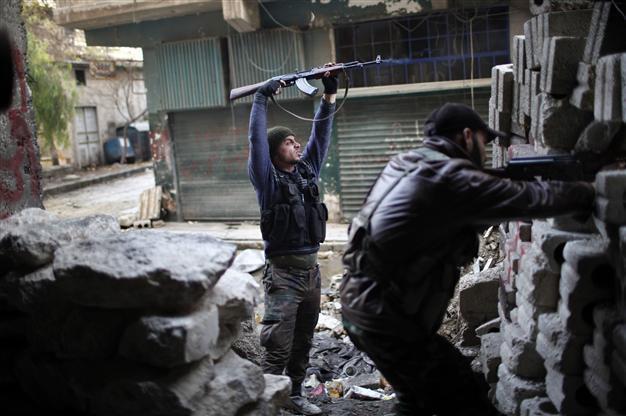World giving Syria regime licence to kill: opposition
DAMASCUS - Agence France-Presse

Free Syria Army fighters fire as they fight with Syrian forces loyal to President Bashar al Assad at the front line in Aleppo. REUTERS Photo
Syria's opposition charged Wednesday that "global inaction" was giving Bashar al-Assad's regime a licence to kill, a day after dozens of young men were found shot execution-style in the city of Aleppo.The comments came after UN envoy Lakhdar Brahimi said the war in Syria had reached "unprecedented levels of horror," telling the UN Security Council it had to act immediately to halt the carnage.
Witnesses and activists said the bodies of 78 young men, all executed with a single gunshot, were found Tuesday in a river in Aleppo, adding to the grim list of massacres committed during Syria's 22-month conflict.
Rebels blamed the regime for the killings, but Syrian authorities accused the jihadist group Al-Nusra Front of having carried out the massacre.
The Syrian National Coalition, the main opposition alliance, called on rights groups to investigate the slaughter and "bring the killers to justice." The "ongoing global inaction towards human rights violations in Syria encourages the killers to continue their crimes... The extreme complacency in the positions of most countries... gives the green light for the perpetrators of genocide to continue what they are doing." The Coalition expressed "shock at the new horrific massacre committed by (President Bashar al-) Assad's regime against innocent civilians." It called on the divided Security Council to refer the issue to The Hague-based International Criminal Court.
"The world has abandoned its moral duty and political commitment to the Syrian people, leaving the criminal Syrian regime to kill scores of citizens using the most brutal and cowardly tactics," the statement said.
In Aleppo, rebel fighter Abu Seif said 78 bodies had been retrieved from the Quweiq River and that more were still in the water but could not be reached because of the threat of Assad snipers.
"The regime threw them into the river so that they would arrive in an area under our control, so the people would think we killed them," Abu Seif said.
But a Syrian security official accused "terrorists," the regime term for rebels, of the killings. There was no claim of responsibility, but state news agency SANA said the jihadist Al-Nusra Front carried out the executions.
Al-Nusra has gained notoriety for its suicide bombings and also become a key fighting force throughout the country.
Its suspected affiliation to the Al-Qaeda offshoot in Iraq has seen it added to the US list of terrorist organizations.
Twenty-two months of conflict have now killed more than 60,000 people, according to the United Nations, which was sponsoring an international donors conference in Kuwait on Wednesday seeking $1.5 billion (1.1 billion euros) in humanitarian funding.
A top Gulf official said nearly $1 billion had already been promised, including $300 million each from Kuwait, Saudi Arabia and the United Arab Emirates.
The Security Council has been paralysed for more than a year, with Russia and China having vetoed three Western-drafted resolutions that would only have have threatened sanctions.
In remarks to the council on Tuesday, Brahimi said Syria "is breaking up before everyone's eyes," and that the "tragedy does not have an end." "Only the international community can help, and first and foremost the Security Council." Assad's forces have become more repressive, he was quoted as telling the closed meeting, but the state and the rebel opposition were committing "equally atrocious crimes."
"That is why I believe the Security Council simply cannot continue to say 'we are (in) disagreement, therefore, let's wait for better times'. I think they have got to grapple with this problem now." In Kuwait, Iran's Undersecretary for Arab and African Affairs Amir Hussein Abdullahian said Damascus ally Tehran believes the "cause of the Syrian crisis is the sending of arms to terrorist groups into Syria by some countries." For its part, the International Committee of the Red Cross said the "suffering of men, women and children has reached unprecedented levels across the country." January's harsh weather conditions had "not only deepened the misery of displaced people" but made it harder for aid convoys to get to them.
















